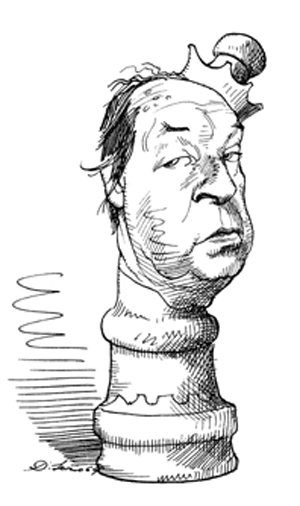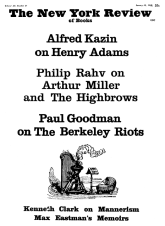The uncovering of the enigmatic V. Sirin proceeds. Three novels and three volumes of short stories, to be sure, remain in the original Russian, but publication of The Defense (originally, and better, titled The Luzhin Defense when it first came out in 1929) now brings to five the number of novels which appeared under Vladimir Nabokov’s favorite pseudonym, and which, more than thirty years later, have reappeared in a new language under his own name. Among his other distinctions, it appears, Nabokov is one of our more eminent recidivists. To have a buried career blossoming afresh, while he proceeds with another, on the upper level as it were, is a special and delightful destiny.
The Gift (1937/1963) is thematically and stylistically the richest of the early books. Taking the author’s exile from Russia as its central theme, it comes close to rejecting the self-pity and self-glorification that usually surrounds that experience. It describes, summarizes, and rather coldly dismisses the business of writing in a dead language for a dying audience. Thus it is a highly self-conscious “literary” book, in which is chronicled, almost clinically, the demise of a great Russian novelist. The Defense, on the other hand, is lighter, less ornate, more of a story. With Invitation to a Beheading and the still earlier and more primitive Laughter in the Dark, it belongs in the class of macabre entertainments, novels which try to spook us. Looked at chronologically, these novels seem to emancipate themselves progressively from the clichés of villainy and menace to become genuine studies of obsession, mechanisms within which the chief actor is both executioner and victim. Alexsandr Ivanovich Luzhin, protagonist of The Defense, represents a major advance over the wretched Cincinnatus C. (of Invitation to a Beheading) and the manipulated Albinus R. (of Laughter in the Dark) precisely in this way. No villains stand over Luzhin. His grim destiny is generated by nothing less than his extraordinary, and only, talent for the game of chess. His gift is to sense, beneath the position of the pieces on the board, the first wavering and then inescapable rhythms of an attack directed against him by an implacable, impersonal opponent. Unable to defend himself against the assaults of his own talent for subtle diagnosis, he commits suicide. To say that he has suffered checkmate is more than a metaphor; it is a way of defining a confusion about life and a game in which there has been an actual, disastrous interchange. If there is a villain, it is perhaps the most helpless creature in the book, the girl who becomes Luzhin’s wife. For in effect she is trying to rescue her husband from the world of chess, urging him to live in the “real” world, where he can never hope to be more than an ungainly fish out of water, where he is always secretly, compulsively solving chess problems in his head. In her own endearing, well-meaning way, she is working against the grain of his existence—while Valentinov, the ex-manager, a ruthless Svengali-type who looks much more like a villain, seems to me to play no such role.
There are, then, subtle cross purposes at the heart of the novel—where the girl, by being right, in a human way, is wrong about Luzhin’s sterile, perverted talent—whereas the inhuman monster is really, and fatefully, right. For in fact the game of chess as Luzhin plays it is a metaphor for the creative life generally. Just as Humbert Humbert’s perversion is a mask for love, so Luzhin’s instinctive gift for chess is in embryo the artist’s passion for order, discipline, insight. We cannot really want him to be saved from his gift. So the book tantalizes, unsettles, and delights the teetering reader by playing against one another the several sorts of judgment that he, as a reader of fiction, is bound to be making. For him too the story of Luzhin becomes a game, filled with the author’s switches, traps, and cross-indications; under a simpler and more ingratiating surface, it is almost as tough to decipher as Pale Fire.
The Defense in its English version is mobile, various, inventive, explosive, crowded with imagery, lyrical in some passages to the dangerous edge of falsity, hard and abrupt elsewhere. The consciousness of Luzhin, in which most of the story is mirrored, has interesting peculiarities, being simultaneously abstract and detailed; he sees physical phenomena close up, like his contemporary, Benjy, in The Sound and the Fury; and, like Benjy, he makes few of the obvious connections between them, being absorbed in puzzling out a larger intent, a deeper plan. Oblivious to considerations of personal pride and advantage, he is almost completely inarticulate throughout the novel—a sloppy, ursine, middle-aged child, one side of whose brain is grotesquely overdeveloped. By the sheer force of imaginative writing, the inner life of this endearing monstrosity is made present to us, throughout the book, with the unnatural intensity of nightmare.
Advertisement
A special piece of bravura is provided by chess patterns insidiously scattered through the book, as if stitched into the very fabric of Luzhin’s being. Checkerboards of black and white dance through his consciousness, as images of his past career, as literal markings on Berlin taxicabs, as a pattern of moonlight with his own enigmatic shadow falling across it. Even some of the characters are personified chess pieces: a couple of drunken clowns named Kurt and Karl act briefly as pawns in a gambit too large for them to comprehend, and Turati, the Italian champion whom Luzhin can never quite beat, lacks only a consonant to be a man of towers and castles (his game is said to be idiosyncratic in concentrating power on the flanks and neglecting the center). This ingenious embroidery is not irrelevant to the pattern of the novel. It suggests (and, in terms of the novel’s own “real world,” confirms) the reality of what the book never fails to depict as obsession. Luzhin is mad to think the world a game of chess—except that the world in this novel is a game of chess. As for that cunning antagonist whom paranoid Luzhin senses behind the play, and whose strategy he is unable to fathom, who drives him to suicide—surely that is the author himself. If, then, the author is himself something of a villain, the absence of a villainous character in the book can be partly explained, and so too perhaps the warmth and sympathy which surround the figure of Luzhin. He is, unlike most of Nabokov’s heroes, a fellow to whom it is possible to become attached.
The world as stylized and ultimately transfigured by the artifice of chess is, then, the theme of The Defense, and, remembering its date of composition as 1929, we will doubtless think it a venture more prophetic of Nabokov’s later development than even that allusive, retrospective, and in some ways richer novel, The Gift. To push stylization through obsession to the creation of a wholly new private world—or at least to the radical unsettling of the reader’s position in this one—is part of a rather special artistic strategy. In this connection Nabokov’s work can be compared to the work of Jorge Luis Borges. Like those of Borges, Nabokov’s characters are continually creating new worlds of their own; a key image in both writers is the mind as a warped mirror.* As creators of a private order, they invite identification with the order-obsessed writer, and their multiple worlds of compulsion, perversion, and defiant private fantasy are those of artistic stylization. Unlike Borges, Nabokov does not generally see his characters as intellectual propositions. Humiliated, quivering animals, they are hurt and hit back. (Hence the importance of defense in Nabokov’s fiction, from Cincinnatus C. and Luzhin to Humbert Humbert; his central characters all seek a tribunal before which to offer rebuttal or an explanation. Yet it is curious that in chess as in literature, there is no such thing as pure defense; the only possible defense is a form of attack.) Again like the characters of Borges, Nabokov’s characters lose themselves in the image they have created, in the formal gridwork they place over experience in order to control it. Their diabolically ingenious defenses against evil are in the end the evil itself, or a major part of it. Multiply alienated, then, from their health as well as their sickness, they are held together only by their author’s voluminous words; so that for Nabokov, every character is really an adventure in style, a testing of style’s ability to control its own energies. Fascination with fantastically reduplicated reality is most evident in Pale Fire, but it is already felt in The Defense; and it is especially captivating when combined with that detailed and specific expertise of which Nabokov and Borges are masters. The hard style, the specific fact, the acurate surface, yes; but soaring behind it, is the imagination, which calls all things into question and by a simple shift of perspective makes plain to us the extraordinary within the commonplace. Indeed the exploding worlds, the hard controlling styles, the erudite fantasies and duplicities of Nabokov and Borges seem a welcome alternative to the glut of fact, social or psychological, that has dominated American fiction for the past fifty years.
In these early novels of Nabokov’s, one sees the later complexities often in surprisingly well-developed form, and they are interesting for that reason. But they have, in addition, a special charm of their own. Nabokov’s world is not austerely intellectual (like the worlds conceived by Borges). It is haunted by certain memories of nineteenth-century baroque (a memory of mad King Ludwig, a melody of overwrought Schumann, something rhapsodic and rotten). And Luzhin, like Humbert is capable of old-fashioned love. Stammering, shambling, lost and incompetent among his shadows, he is still a lover. This is no part of his defense, quite the contrary, it is the root of a fatal weakness. But it is more appealing than the complexities of Kinbote and Gradus and their misanthropic rage.
Advertisement
This Issue
January 14, 1965
-
*
See Paul de Man on Borges (NYR, Nov. 19, 1964). ↩




